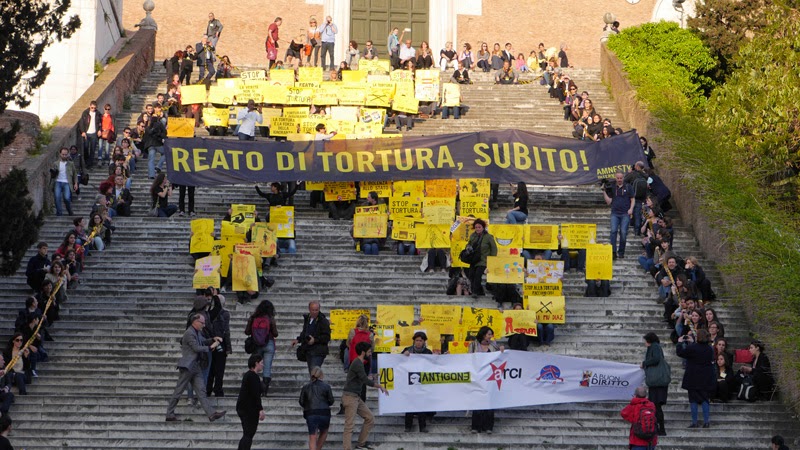Should victims of torture be compensated? The ECtHR says no
Strasbourg. The European Court of Human Rights has rejected the request of the Renzi government for an amicable settlement in the case of the two detainees tortured in the prison of Asti. And so the case will go to trial. The trial, impossible in Italy thanks to the absence of it being a crime in the criminal code, will take place in a European site. Patrizio Gonnella, president of Antigone and CILD, writes about it in an editorial for today’s edition of il Manifesto.
The European Court of Human Rights has rejected the request of the Renzi government for amicable settlement in the case of the two detainees tortured in the prison of Asti, deciding instead to go to trial to assess the question.
It is an important decision that forces Italy to confront its responsibilities, the very same ones that faced our country after being condemned for torture in connection with the Diaz raid during the G8 summit in Genoa. On April 7, 2015, the Court of Strasbourg found us guilty of the events that transpired on the night of the “Mexican slaughterhouse” as well as for the fact that Italy did not have a law punishing torture. The absence of such a law is, in fact, a direct line to impunity.
In November 2015 the Italian government proposed compensation equivalent to 45,000 euros to both of the detainees tortured in Asti without, however, making any commitment to resolving the question of why torture is not considered a crime in our criminal code. This amounts to a monetization of suffering inflicted without any assumption of political responsibilities.
The case of Asti began in 2004 when the two detainees were stripped naked and brought to solitary confinement; in addition to the windows in the rooms having no glass despite the extreme cold, the rooms had no mattresses, sheets, covers, sinks, chairs nor toilets. Their food was rationed, they were prevented from sleeping, were insulted and in the days to come, sometimes even multiple times, were subjected to kicks, punches, full-body beatings and, in the case of one of them, having their head kicked.
Legal proceedings began in February 2005 after the interception of two calls of various penitentiary police under investigation for other reasons, but they were only brought to trial six years later. Antigone filed a civil suit.
On January 30, 2012, a first-degree sentence was delivered and the Court of Cassation closed the case on July 27 of the same year. Not a single one of the four under indictment was convicted, for, seeing as the crime of torture does not exist, they would have had to be convicted of lesser crimes that were either no longer prosecutable or were barred from being pursued further. The sentencing judge wrote that the details could, in fact, be considered torture as understood by the UN Convention but that they could not be prosecuted as such as Italy did not have a law recognising the crime.
Therefore Antigone, together with lawyer Simona Filippi, its ombudswoman, joined forces with Antonio Marchesi, president of Amnesty International Italia, to organise an appeal to the European Court of Human Rights. Last November the Court declared it admissible. The Italian government instead proposed the settlement without saying a single word about that crime which does not exist.
Yesterday, in any event, the Court refused the transaction. And it is precisely because of this lacuna that the government must now act. Discussion in Parliament is dying out. Without an injection from outside, this legislature too will fade away without anything having changed.
After the condemnation for torture at Diaz, Prime Minister Renzi wrote a Tweet stating that the person ruling the country would have declared it a crime. That Tweet, however, did not seem to produce any reflection in Parliament. Or rather, the Senate first made the text that had been approved by Chamber of Deputies significantly worse and then they effectively shelved it.
Almost thirty years have passed since the UN Convention against Torture was adopted. In the meantime, we have consistently been cutting a fine figure, for example, not being able to extradite torturers who are residents in Italy to countries where they could be sentenced. For this reason, together with the more than 54,000 signatures we have collected in our petition, we are asking the government to approve a law in compliance with the UN text immediately.
The United Nations has recently expanded the new penitentiary rules, calling them “Mandela Rules” in honour of the great South African statesman. In these rules the word “torture” appears a good eight times. In our own criminal code not even once.





